Discussion board one is about legislation being proposed in Oregon to limit grocery stores in their state to a maximum of two self-checkout stations. In
Discussion board one is about legislation being proposed in Oregon to limit grocery stores in their state to a maximum of two self-checkout stations. In proposing the legislation, they mention 10 specific ways the technology is causing harm as justification for the limit. Please see the related documents for specific details.
Based on the related articles, you will write in the canvas discussion board answering the questions below. You need to number each answer so it is clear which question you are answering.
- Should there be legislation to protect jobs from new innovations in technology and automation?
- Do you agree with their position that increased use of technology and not interacting with people contributes to social isolation and negative health consequences?
General Requirements
- You will post in the Canvas discussion board to submit
- Each answer should be numbered
- It must be submitted by the due date or it will not be accepted.
Specific Requirements for your post
- Discuss each question in detail, and number them so it is clear which is being answered. Meeting the length requirement with one answer and not answering the other will result in a deduction in your grade.
- Even though this is a discussion board post and not a paper, it must be clearly written, with correct grammar, and a professional presentation.
- The length should be enough to adequately answer each question, which is a total of 250 words (i.e. approximately 125 words for each question.)
Grading Rubric (possible 5 points):
| Description | Itemized Value | Total Possible |
| Question 1 | 1.5 points | 1.5 |
| Question 2 | 1.5 points | 1.5 |
| Well written with correct grammar and spelling | 1 point | 1 |
| Meets length requirement (250+ words) and assignment requriements | 1 point | 1 |
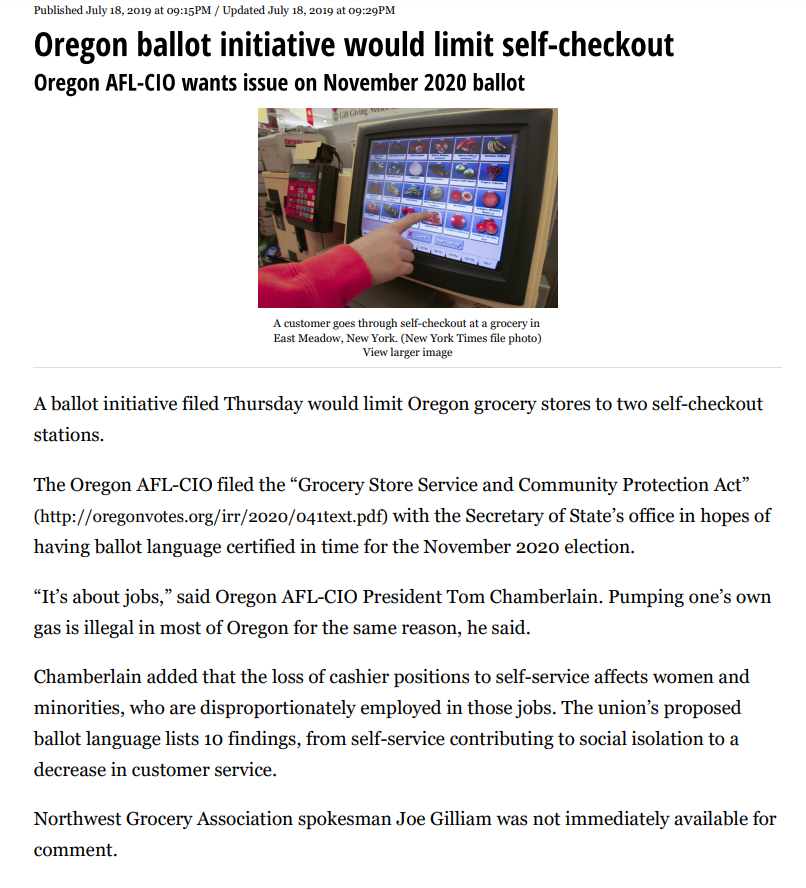
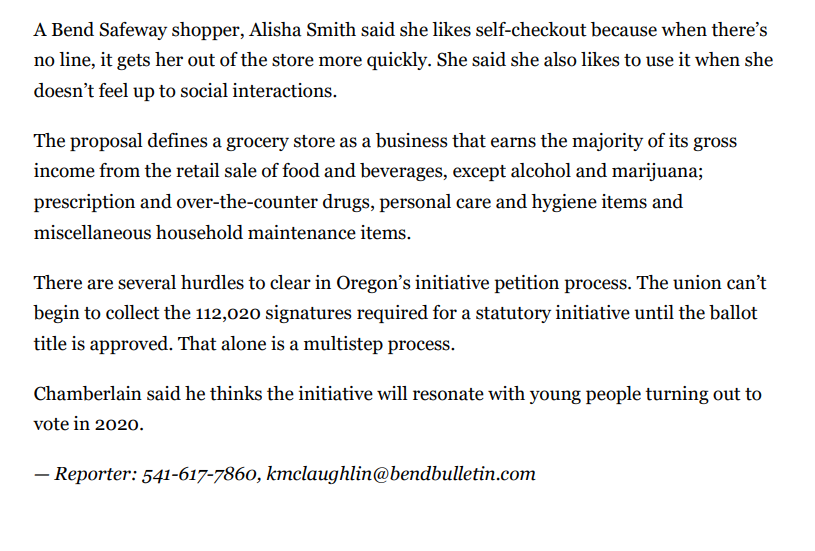
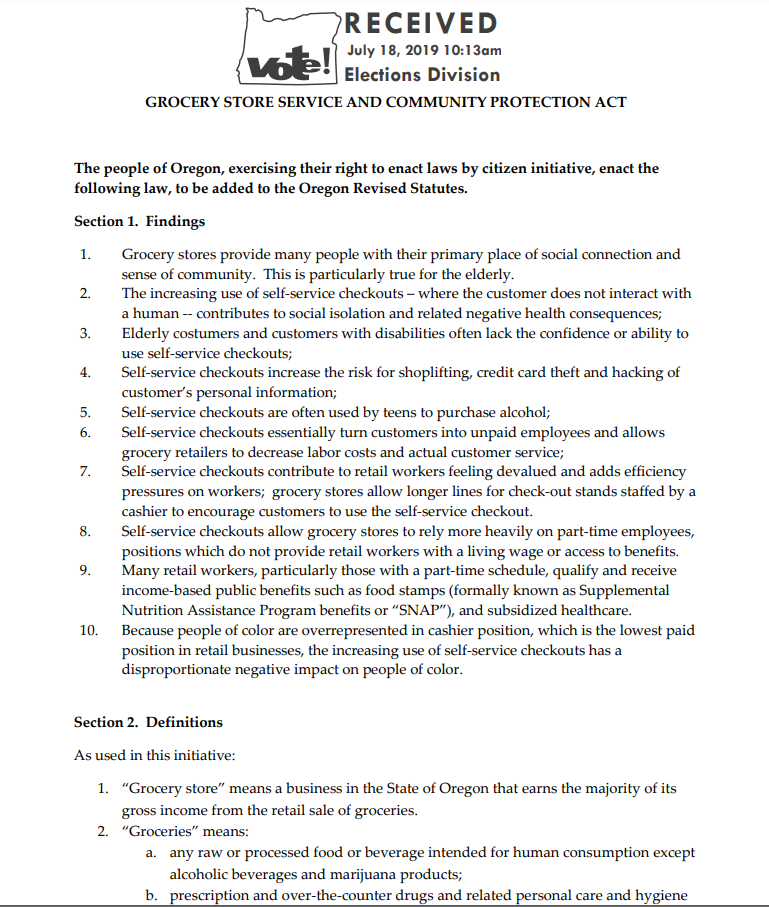
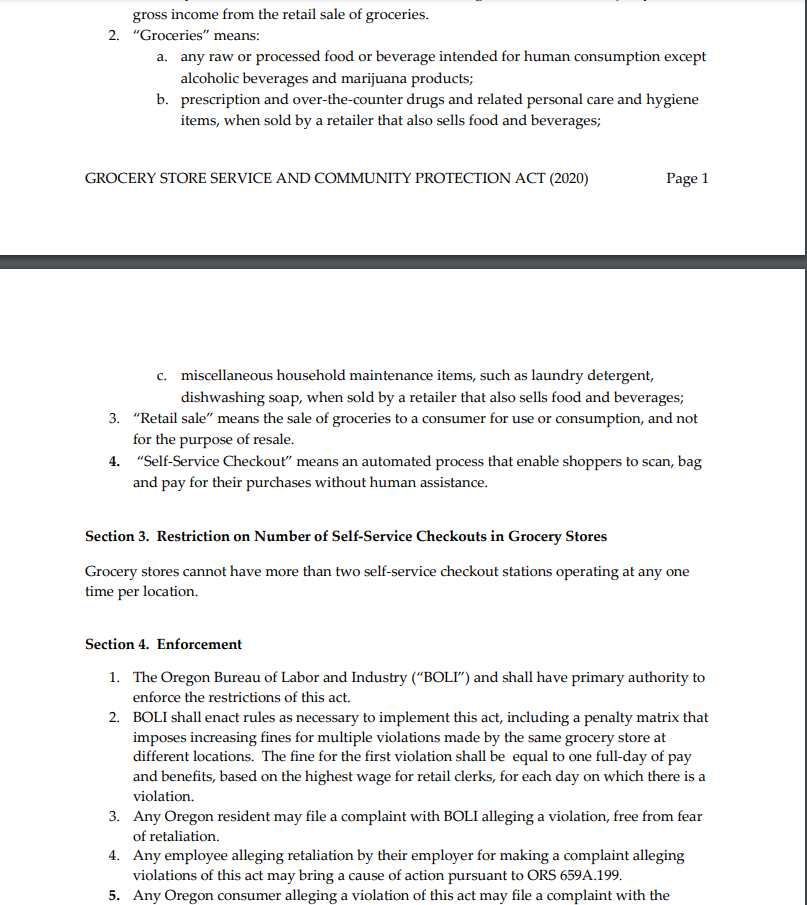
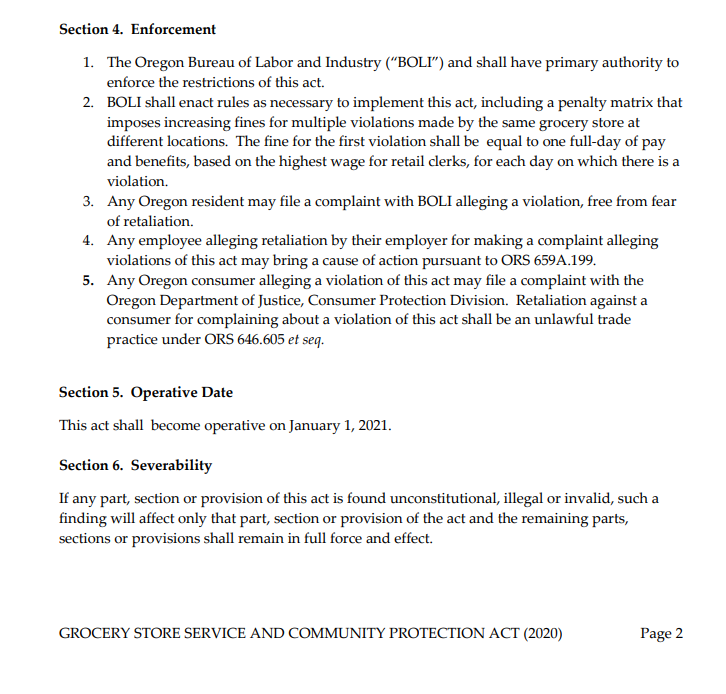
Published July 18, 2019 at 09:15PM / Updated July 18, 2019 at 09:29PM Oregon ballot initiative would limit self-checkout Oregon AFL-CIO wants issue on November 2020 ballot A customer goes through self-checkout at a grocery in East Meadow, New York. (New York Times file photo) View larger image A ballot initiative filed Thursday would limit Oregon grocery stores to two self-checkout stations. The Oregon AFL-CIO filed the Grocery Store Service and Community Protection Act (http://oregonvotes.org/irr/2020/041text.pdf) with the Secretary of State's office in hopes of having ballot language certified in time for the November 2020 election. It's about jobs, said Oregon AFL-CIO President Tom Chamberlain. Pumping one's own gas is illegal in most of Oregon for the same reason, he said. Chamberlain added that the loss of cashier positions to self-service affects women and minorities, who are disproportionately employed in those jobs. The union's proposed ballot language lists 10 findings, from self-service contributing to social isolation to a decrease in customer service. Northwest Grocery Association spokesman Joe Gilliam was not immediately available for comment. A Bend Safeway shopper, Alisha Smith said she likes self-checkout because when there's no line, it gets her out of the store more quickly. She said she also likes to use it when she doesn't feel up to social interactions. The proposal defines a grocery store as a business that earns the majority of its gross income from the retail sale of food and beverages, except alcohol and marijuana; prescription and over-the-counter drugs, personal care and hygiene items and miscellaneous household maintenance items. There are several hurdles to clear in Oregon's initiative petition process. The union can't begin to collect the 112,020 signatures required for a statutory initiative until the ballot title is approved. That alone is a multistep process. Chamberlain said he thinks the initiative will resonate with young people turning out to vote in 2020. Reporter: 541-617-7860, kmclaughlin@bendbulletin.com RECEIVED July 18, 2019 10:13am Elections Division GROCERY STORE SERVICE AND COMMUNITY PROTECTION ACT vote! 4. 5. The people of Oregon, exercising their right to enact laws by citizen initiative, enact the following law, to be added to the Oregon Revised Statutes. Section 1. Findings 1. Grocery stores provide many people with their primary place of social connection and sense of community. This is particularly true for the elderly. 2. The increasing use of self-service checkouts - where the customer does not interact with a human -- contributes to social isolation and related negative health consequences; 3. Elderly costumers and customers with disabilities often lack the confidence or ability to use self-service checkouts; Self-service checkouts increase the risk for shoplifting, credit card theft and hacking of customer's personal information; Self-service checkouts are often used by teens to purchase alcohol; 6. Self-service checkouts essentially turn customers into unpaid employees and allows grocery retailers to decrease labor costs and actual customer service; 7. Self-service checkouts contribute to retail workers feeling devalued and adds efficiency pressures on workers; grocery stores allow longer lines for check-out stands staffed by a cashier to encourage customers to use the self-service checkout. 8. Self-service checkouts allow grocery stores to rely more heavily on part-time employees, positions which do not provide retail workers with a living wage or access to benefits. 9. Many retail workers, particularly those with a part-time schedule, qualify and receive income-based public benefits such as food stamps (formally known as Supplemental Nutrition Assistance Program benefits or "SNAP"), and subsidized healthcare. 10. Because people of color are overrepresented in cashier position, which is the lowest paid position in retail businesses, the increasing use of self-service checkouts has a disproportionate negative impact on people of color. . 9. Section 2. Definitions As used in this initiative: 1. "Grocery store" means a business in the State of Oregon that earns the majority of its gross income from the retail sale of groceries. 2. "Groceries" means: a. any raw or processed food or beverage intended for human consumption except alcoholic beverages and marijuana products; b. prescription and over-the-counter drugs and related personal care and hygiene gross income from the retail sale of groceries. 2. "Groceries" means: a. any raw or processed food or beverage intended for human consumption except alcoholic beverages and marijuana products; b. prescription and over-the-counter drugs and related personal care and hygiene items, when sold by a retailer that also sells food and beverages; GROCERY STORE SERVICE AND COMMUNITY PROTECTION ACT (2020) Page 1 c. miscellaneous household maintenance items, such as laundry detergent, dishwashing soap, when sold by a retailer that also sells food and beverages; 3. "Retail sale" means the sale of groceries to a consumer for use or consumption, and not for the purpose of resale. 4. "Self-Service Checkout" means an automated process that enable shoppers to scan, bag and pay for their purchases without human assistance. Section 3. Restriction on Number of Self-Service Checkouts in Grocery Stores Grocery stores cannot have more than two self-service checkout stations operating at any one time per location. Section 4. Enforcement 1. The Oregon Bureau of Labor and Industry (BOLI") and shall have primary authority to enforce the restrictions of this act. 2. BOLI shall enact rules as necessary to implement this act, including a penalty matrix that imposes increasing fines for multiple violations made by the same grocery store at different locations. The fine for the first violation shall be equal to one full-day of pay and benefits, based on the highest wage for retail clerks, for each day on which there is a violation. 3. Any Oregon resident may file a complaint with BOLI alleging a violation, free from fear of retaliation 4. Any employee alleging retaliation by their employer for making a complaint alleging violations of this act may bring a cause of action pursuant to ORS 659A.199. 5. Any Oregon consumer alleging a violation of this act may file a complaint with the Section 4. Enforcement 1. The Oregon Bureau of Labor and Industry ("BOLI) and shall have primary authority to enforce the restrictions of this act. 2. BOLI shall enact rules as necessary to implement this act, including a penalty matrix that imposes increasing fines for multiple violations made by the same grocery store at different locations. The fine for the first violation shall be equal to one full-day of pay and benefits, based on the highest wage for retail clerks, for each day on which there is a violation. 3. Any Oregon resident may file a complaint with BOLI alleging a violation, free from fear of retaliation. 4. Any employee alleging retaliation by their employer for making a complaint alleging violations of this act may bring a cause of action pursuant to ORS 659A.199. 5. Any Oregon consumer alleging a violation of this act may file a complaint with the Oregon Department of Justice, Consumer Protection Division. Retaliation against a consumer for complaining about a violation of this act shall be an unlawful trade practice under ORS 646.605 et seq. Section 5. Operative Date This act shall become operative on January 1, 2021. Section 6. Severability If any part, section or provision of this act is found unconstitutional, illegal or invalid, such a finding will affect only that part, section or provision of the act and the remaining parts, sections or provisions shall remain in full force and effect. GROCERY STORE SERVICE AND COMMUNITY PROTECTION ACT (2020) Page 2 Published July 18, 2019 at 09:15PM / Updated July 18, 2019 at 09:29PM Oregon ballot initiative would limit self-checkout Oregon AFL-CIO wants issue on November 2020 ballot A customer goes through self-checkout at a grocery in East Meadow, New York. (New York Times file photo) View larger image A ballot initiative filed Thursday would limit Oregon grocery stores to two self-checkout stations. The Oregon AFL-CIO filed the Grocery Store Service and Community Protection Act (http://oregonvotes.org/irr/2020/041text.pdf) with the Secretary of State's office in hopes of having ballot language certified in time for the November 2020 election. It's about jobs, said Oregon AFL-CIO President Tom Chamberlain. Pumping one's own gas is illegal in most of Oregon for the same reason, he said. Chamberlain added that the loss of cashier positions to self-service affects women and minorities, who are disproportionately employed in those jobs. The union's proposed ballot language lists 10 findings, from self-service contributing to social isolation to a decrease in customer service. Northwest Grocery Association spokesman Joe Gilliam was not immediately available for comment. A Bend Safeway shopper, Alisha Smith said she likes self-checkout because when there's no line, it gets her out of the store more quickly. She said she also likes to use it when she doesn't feel up to social interactions. The proposal defines a grocery store as a business that earns the majority of its gross income from the retail sale of food and beverages, except alcohol and marijuana; prescription and over-the-counter drugs, personal care and hygiene items and miscellaneous household maintenance items. There are several hurdles to clear in Oregon's initiative petition process. The union can't begin to collect the 112,020 signatures required for a statutory initiative until the ballot title is approved. That alone is a multistep process. Chamberlain said he thinks the initiative will resonate with young people turning out to vote in 2020. Reporter: 541-617-7860, kmclaughlin@bendbulletin.com RECEIVED July 18, 2019 10:13am Elections Division GROCERY STORE SERVICE AND COMMUNITY PROTECTION ACT vote! 4. 5. The people of Oregon, exercising their right to enact laws by citizen initiative, enact the following law, to be added to the Oregon Revised Statutes. Section 1. Findings 1. Grocery stores provide many people with their primary place of social connection and sense of community. This is particularly true for the elderly. 2. The increasing use of self-service checkouts - where the customer does not interact with a human -- contributes to social isolation and related negative health consequences; 3. Elderly costumers and customers with disabilities often lack the confidence or ability to use self-service checkouts; Self-service checkouts increase the risk for shoplifting, credit card theft and hacking of customer's personal information; Self-service checkouts are often used by teens to purchase alcohol; 6. Self-service checkouts essentially turn customers into unpaid employees and allows grocery retailers to decrease labor costs and actual customer service; 7. Self-service checkouts contribute to retail workers feeling devalued and adds efficiency pressures on workers; grocery stores allow longer lines for check-out stands staffed by a cashier to encourage customers to use the self-service checkout. 8. Self-service checkouts allow grocery stores to rely more heavily on part-time employees, positions which do not provide retail workers with a living wage or access to benefits. 9. Many retail workers, particularly those with a part-time schedule, qualify and receive income-based public benefits such as food stamps (formally known as Supplemental Nutrition Assistance Program benefits or "SNAP"), and subsidized healthcare. 10. Because people of color are overrepresented in cashier position, which is the lowest paid position in retail businesses, the increasing use of self-service checkouts has a disproportionate negative impact on people of color. . 9. Section 2. Definitions As used in this initiative: 1. "Grocery store" means a business in the State of Oregon that earns the majority of its gross income from the retail sale of groceries. 2. "Groceries" means: a. any raw or processed food or beverage intended for human consumption except alcoholic beverages and marijuana products; b. prescription and over-the-counter drugs and related personal care and hygiene gross income from the retail sale of groceries. 2. "Groceries" means: a. any raw or processed food or beverage intended for human consumption except alcoholic beverages and marijuana products; b. prescription and over-the-counter drugs and related personal care and hygiene items, when sold by a retailer that also sells food and beverages; GROCERY STORE SERVICE AND COMMUNITY PROTECTION ACT (2020) Page 1 c. miscellaneous household maintenance items, such as laundry detergent, dishwashing soap, when sold by a retailer that also sells food and beverages; 3. "Retail sale" means the sale of groceries to a consumer for use or consumption, and not for the purpose of resale. 4. "Self-Service Checkout" means an automated process that enable shoppers to scan, bag and pay for their purchases without human assistance. Section 3. Restriction on Number of Self-Service Checkouts in Grocery Stores Grocery stores cannot have more than two self-service checkout stations operating at any one time per location. Section 4. Enforcement 1. The Oregon Bureau of Labor and Industry (BOLI") and shall have primary authority to enforce the restrictions of this act. 2. BOLI shall enact rules as necessary to implement this act, including a penalty matrix that imposes increasing fines for multiple violations made by the same grocery store at different locations. The fine for the first violation shall be equal to one full-day of pay and benefits, based on the highest wage for retail clerks, for each day on which there is a violation. 3. Any Oregon resident may file a complaint with BOLI alleging a violation, free from fear of retaliation 4. Any employee alleging retaliation by their employer for making a complaint alleging violations of this act may bring a cause of action pursuant to ORS 659A.199. 5. Any Oregon consumer alleging a violation of this act may file a complaint with the Section 4. Enforcement 1. The Oregon Bureau of Labor and Industry ("BOLI) and shall have primary authority to enforce the restrictions of this act. 2. BOLI shall enact rules as necessary to implement this act, including a penalty matrix that imposes increasing fines for multiple violations made by the same grocery store at different locations. The fine for the first violation shall be equal to one full-day of pay and benefits, based on the highest wage for retail clerks, for each day on which there is a violation. 3. Any Oregon resident may file a complaint with BOLI alleging a violation, free from fear of retaliation. 4. Any employee alleging retaliation by their employer for making a complaint alleging violations of this act may bring a cause of action pursuant to ORS 659A.199. 5. Any Oregon consumer alleging a violation of this act may file a complaint with the Oregon Department of Justice, Consumer Protection Division. Retaliation against a consumer for complaining about a violation of this act shall be an unlawful trade practice under ORS 646.605 et seq. Section 5. Operative Date This act shall become operative on January 1, 2021. Section 6. Severability If any part, section or provision of this act is found unconstitutional, illegal or invalid, such a finding will affect only that part, section or provision of the act and the remaining parts, sections or provisions shall remain in full force and effect. GROCERY STORE SERVICE AND COMMUNITY PROTECTION ACT (2020) Page 2











